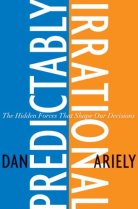Dan Ariely is a Professor of Behaviorial Economics at Duke University and author of Predictably Irrational.
Good morning. I’ll tell you a little bit about irrational behavior – not yours, other peoples’.
Writing academic papers are not that exciting. Often not fun to read, and often worse to write. So I tried to write a cook book – Dining Without Crumbs: The art of eating over the sink. MIT Press turned me down by saying, “cute, but not for us.” I was told if I really want to do a creative book like this – free, less constrained – I was advised to first write a book about my actual research and then I’ll get to do my cookbook.
Writing my book about my research turned out to be pretty fun.
I want to tell you a little bit about irrational behavior, and I’ll start with some examples. Our intuition is really fooling us in a predictable way and there’s nothing we can do about it.
“Decision Illusions”
Illusions as a metaphor. In visual illusions, we can easily demonstrate the mistakes. In cognitive illusions it is difficult to do that.
Example: Organ Donations. Certain countries have a higher rate of donations. Why? Turns out it had to do with the DMV form, the person who is designing the form has a big impact on changing behavior.
Opt-in – “Check the box below if you want to participate in the organ donor program.
Opt-out – “Check the box below if you don’t want to participate in the organ donor program.
People tend to NOT check the box, and the statistics change, the decisions change.
What about professionals?
Take a group of physicians and a patient with hip issues. You decided a few weeks ago nothing is working for this patient so you refer the patient to get hip replacement. Yesterday you review the patient’s case and you realized you had not tried Ibuprofen. What do you do? Pull the patient off the line for hip replacement? Yes, most physicians will try the Ibuprofen.
Another group of physicians do some testing and realized that they had not tried Piroxicam or Ibuprofen – now that’s adding another decision factor. Moving forward with hip replacement becomes an easier solution – and many physicians go for hip replacement.
I give you a choice. A trip to Rome, all expenses covered. Or a weekend in Paris. Or having your car stolen. But what if I added a condition. You get a trip to Rome, all expenses paid, but no coffee is included. You have to pay for it. Now Rome with coffee becomes more superior than Rome without coffee.
Example: The Economist subscription offer
Economist.com = $59 :: Print = $125 :: Economist.com + Print = $125
I tested this offer with some students and this was the result:
Economist.com = 16% :: Print = 0% :: Both = 84%
I tested again by taking away the useless option. The numbers changed: Economist.com = 68% :: Both = 32%
When the offers are pitted against each other, “Both” seems more superior. When we don’t know our preferences, we are influenced by these types of offers.
The general point: Are we Superman or Homer Simpson?
If we understand our limitations we can build around it. We somehow forget the idea we are limited. If we understand our cognitive limitations, along with our physical limitations, we can build a better world.



2 Trackbacks
[…] example, one of my favorite talks was Dan Ariely’s on his research and book – “Predictably Irrational.” He has […]
[…] and made logical points and smart analogies. maybe i paid so much attention because i was transcribing his talk in real time (not as easy as you’d think). but i’m glad i […]